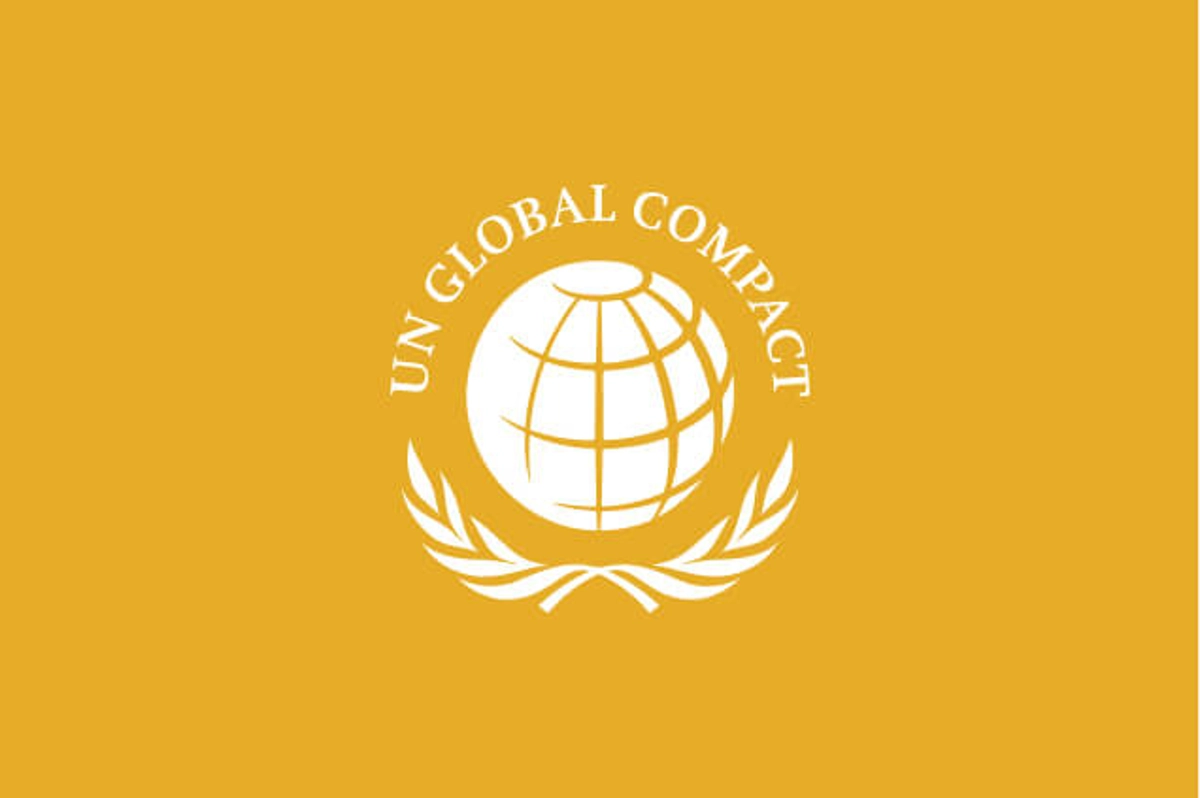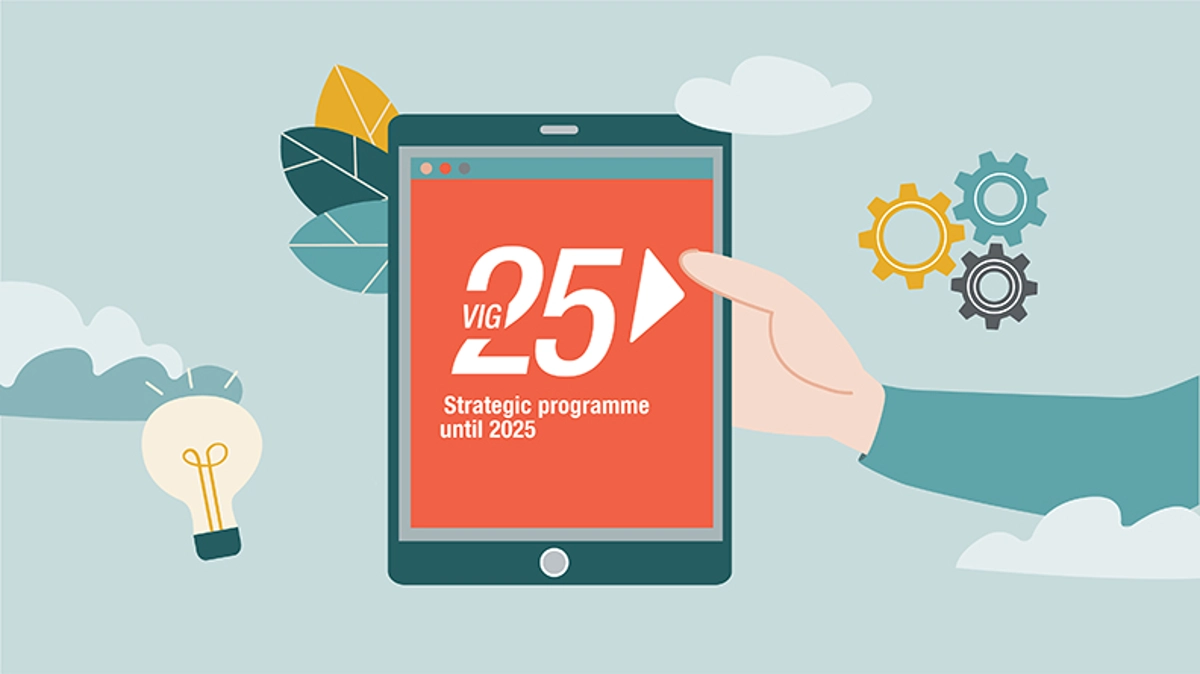SUSTAINABILITY programme
The VIG Sustainability Programme was developed in a collaborative process with the VIG insurance companies as part of the VIG 25 strategy programme. The Group-wide programme aims to further strengthen sustainability as an integral part and foundation of the business model.
The Programme consists of five building blocks, which are described in more detail below.
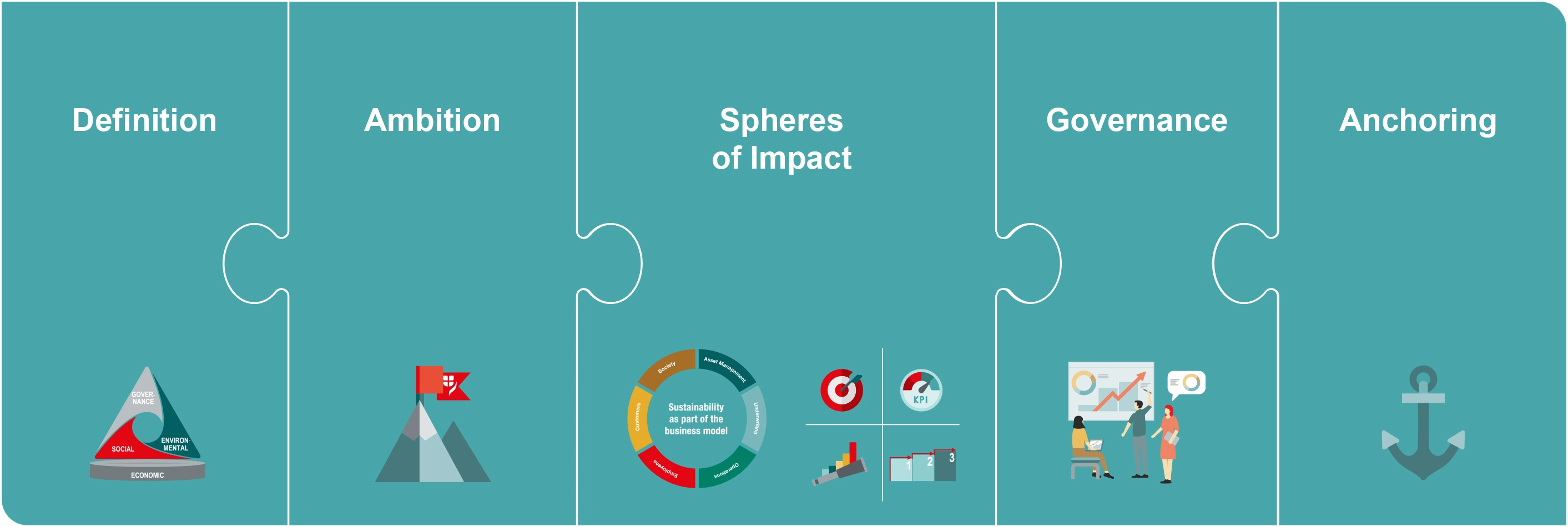
Our sustainability definition
For VIG, sustainability means creating economic value today without doing so at the expense of tomorrow. This definition, which is derived from the 1987 Brundtland Report “Our Common Future”, takes into account four components that ensure the Group’s long-term success:
- Economic component: VIG pursues a profitable business model that creates sustainable value for the Group’s stakeholders, thereby ensuring the Group’s continued economic existence.
- Governance component: Corporate governance that is responsible, transparent and geared towards long-term success is central to VIG. The Group is a dependable partner on the market and for the society.
- Social component: VIG wants to contribute towards a well-functioning community and a stable, economically resilient society in which all members can participate. VIG offers its customers a comprehensive range of insurance products and creates an attractive working environment for its employees.
- Environmental component: VIG takes into account the impact of its business activities on the environment and helps to reduce the negative effects of climate change so that it can continue to operate in a world worth living in for everyone in the future.
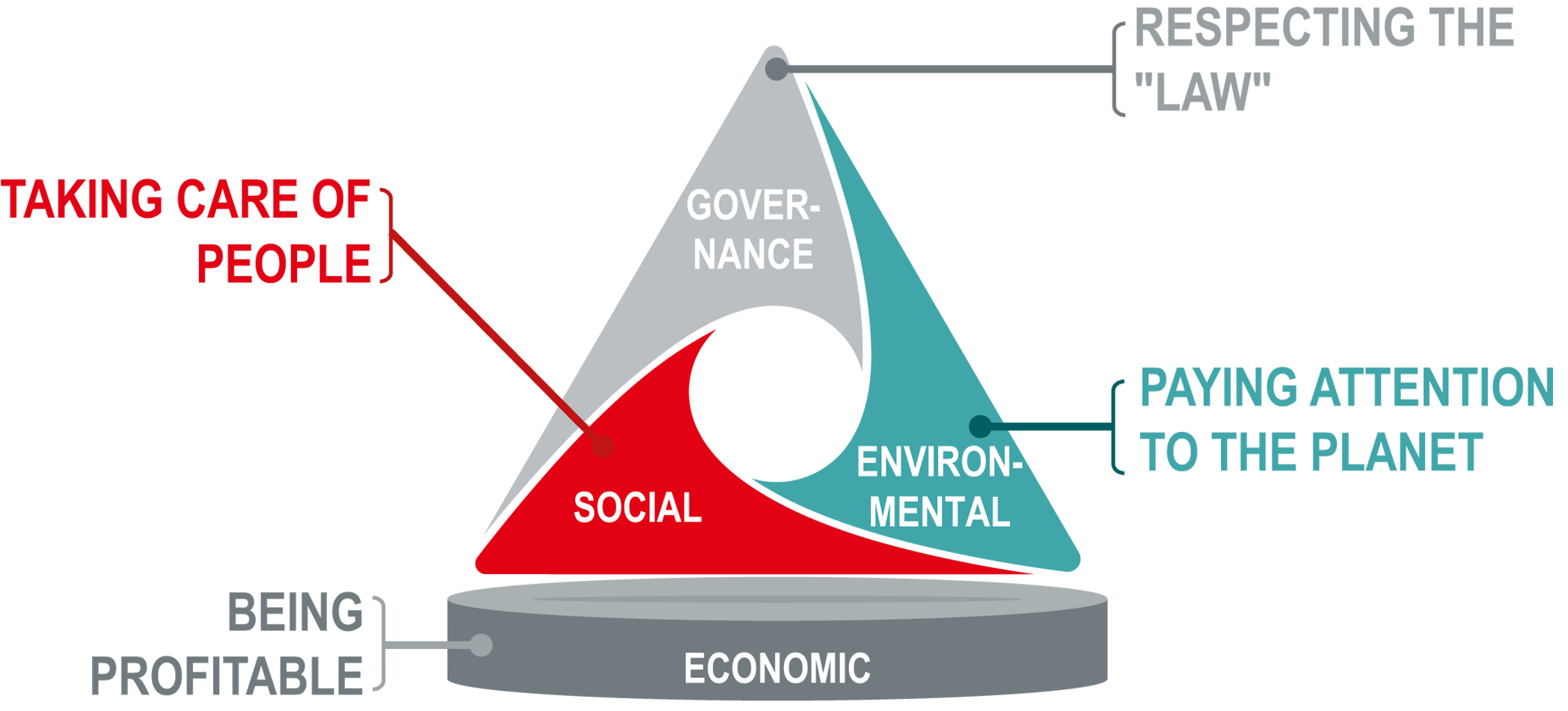
Our Ambition
Various factors, such as the Group strategy, stakeholder expectations and regulatory developments in our markets, were taken into account to determine VIG's ambition in the area of sustainability. Based on this, the ambition of the VIG Sustainability Program was developed together with the VIG insurance companies to define the direction of development for the coming years. In addition to environmental aspects, VIG also wants to make a positive contribution in the social area and act as a role model in its markets, in line with VIG's position as market leader.

THE SIX SPHERES OF IMAPCT OF THE SUSTAINABILITY PROGRAMME
The six spheres of impact under the VIG Sustainability Programme set out the sustainability-related focus areas for the coming years. The three spheres of impact asset management, underwriting and operations focus primarily on environmental aspects, while the spheres employees, customers and society primarily address social aspects.
In order to achieve a measurable impact, each field of action is addressed on the basis of four dimensions.
- The long-term objective represents the guiding principle for the respective spheres of impact and sets the direction for all activities in the respective area.
- The quantifiable key performance indicators (KPIs) are used to assess and measure the status and progress in achieving the objectives.
- (Interim) targets are formulated and, if necessary, forecasts of future developments (e.g. the development of CO2 emissions) are drawn up in order to concretize the objective. The targets can be qualitative or quantitative. The basis for this is the initial baseline determined for each spheres of impact.
- The supporting levers define a general approach that contributes to achieving the goals and objectives. A lever usually leads to various specific activities and measures.
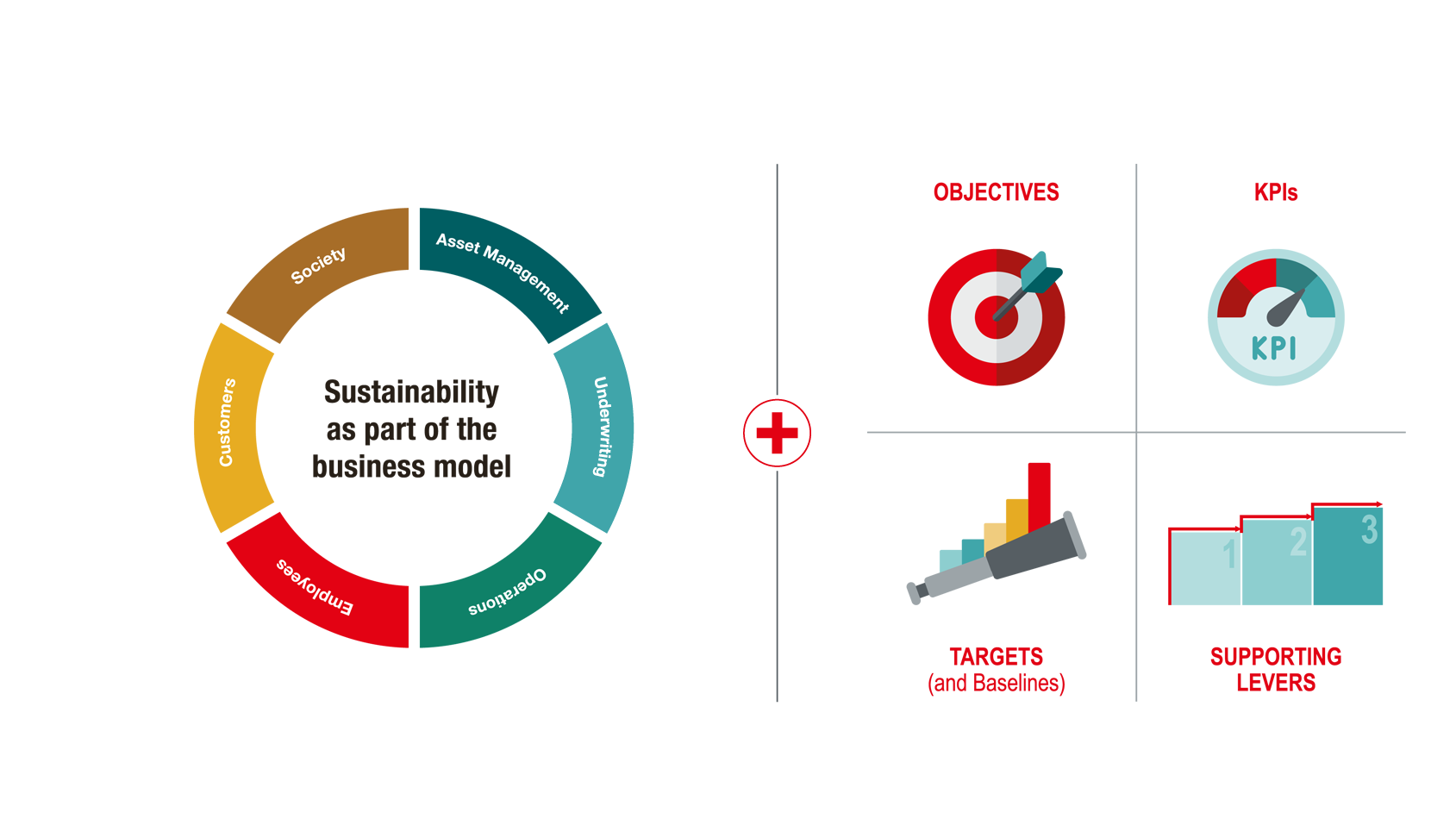
Asset Management
How we invest today has an impact on our future. Responsible investments can make a contribution to the climate and energy transition and to overcoming social challenges. VIG is therefore pursuing the long-term goal of reducing greenhouse gas emissions from selected investment portfolios to net zero by 2050. Social aspects such as respect for human rights are also incorporated in investment decisions.

Our levers
- Implementation of an engagement approach
- Expansion of green investments
- Exclusion criteria for the coal sector, unconventional oil and gas and in connection with the violation of human rights and the principles of the UN Global Compact
Read more on Asset Management
Underwriting
In addition to investment, underwriting, as a core activity of insurance companies, is a key lever for contributing to a sustainable future. The Group’s long-term objective is to reduce greenhouse gas emissions from the corporate underwriting portfolio to net zero by 2050. Furthermore, VIG wants to help its customers to better adapt to climate change and increase the proportion of products and services that are helpful in this regard.

Our levers
- Implementation of an engagement approach
- Exclusion criteria for the coal sector and unconventional oil and gas
- Offering sustainable products and services
Read more on Underwriting
Operations
When it comes to operations, the focus is on the emissions from operating the office infrastructure and from business travel by car and aeroplane. The aim is to become climate neutral by 2030 and to achieve net-zero greenhouse gas emissions by 2050. We envisage achieving these targets through conscious energy consumption, the increased use of renewable energies, or by travelling for business less frequently and in more environmentally friendly ways.

Our levers
- Implementation of energy-saving measures
- Use of renewable energies
- More environmentally friendly business travel
- Measures to raise awareness among employees
Read more on Operations
Employees
Employee motivation and commitment are important for the longterm success of a company. VIG therefore strives to be an attractive employer who promotes equal opportunities, employee centricity and diversity. It is planned to measure the attractiveness as an employer for the majority of Group companies using an international index that will provide insights on potential development opportunities for individual companies at a local level.

Customers
VIG companies serve roughly 32 million customers in 30 countries. The Group relies on a decentralised management approach and local entrepreneurship to satisfy this large diversity of needs and expectations. A centre of competence for customer experience, established in 2023, focuses on aspects such as creating additional benefits for customers and measuring their satisfaction in a standardised manner. Additionally, the VIG insurance companies want to help to close existing protection gaps, particularly with regard to customers. As part of this, they are concentrating on products that target personal resilience and are evaluating product ranges for under-served or socially disadvantaged customers.

Society
People can only protect themselves against a risk if they are aware of it, can accurately estimate its relevance, have knowledge about risk management instruments (such as insurance policies) and ultimately take appropriate action – in short, if they are “risk literate”. A key focus in the sphere of impact “society” is therefore the promotion of risk literacy. VIG wants to support the people in its markets in making well-informed decisions when it comes to risk and will bolster its efforts in the area of risk education. Furthermore, as part of VIG’s Corporate Volunteering initiative, thousands of employees dedicate one working day a year to causes that benefit society.

Our levers
- Creating initiatives on risk literacy
- Promoting corporate volunteering
Read more on Society
our Sustainability management
VIG's sustainability governance is an important element in driving forward the VIG Group's sustainability agenda. The Group Sustainability Office, which was set up in 2023 in the Opportunity Management department of VIG Holding, actively coordinates Group-wide sustainability tasks. The Head of the Group Sustainability Office and Group Sustainability Officer reports directly to the Chairman of the Managing Board. As sustainability is seen as an integral part of the business model, overall responsibility lies with the Group’s Managing Board. A sustainability committee was also set up in 2023. This committee is composed of the Deputy Chaiman of the Managing Board, the CFRO, the COO and heads of department within VIG Holding – primarily from the six spheres of impact under the sustainability programme. It is an advisory committee that serves as a link between the operational levels of the Group and the Managing Board, which has overall responsibility. The Managing Board of VIG Holding in turn regularly informs the members of the Supervisory Board about key sustainability issues.
Anchoring of the sustainability programme
One of VIG's four management principles is local entrepreneurship. This enables the VIG companies to respond to local challenges and opportunities at an operational level. This principle is also followed in the VIG Sustainability Programme and is reflected in the so-called "anchoring". This means that each company has the option to set its own focus as part of the Group-wide sustainability program. VIG Holding supports the companies with helpful tools and regular exchanges to help them implement local sustainability programs and achieve common objectives.



